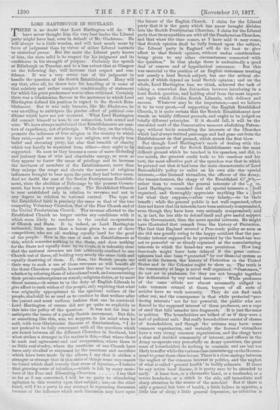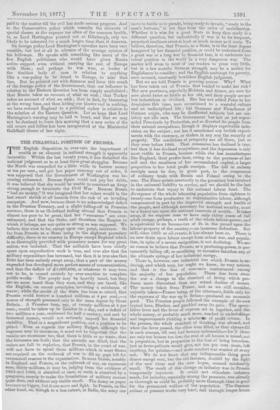LORD HARTINGTON IN SCOTLAND.
THERE is no doubt that Lord Hartington will do. We have never thought him the very best leader the Liberal party might have had, even in default of Mr. Gladstone. He will always be a little wooden, and will lead much more by force of judgment than by virtue of either Liberal instincts or oratorical power. But the more the Liberal party knows of him, the more solid is its respect for his judgment and its confidence in his strength of purpose. Certainly the speech at Edinburgh on Tuesday, and to a less extent that at Glasgow on the following day, will increase that respect and con- fidence. It was a very severe test of his judgment to handle the question of the Scotch Establishment. Many will say that, after all, he threw into his handling of it some of that subtlety and rather complex eonditionality of statement for which his great predecessor was so often criticised. Certainly there was a Gladstonian flavour in the sentences in which Lord Hartington defined his position in regard to the Scotch Esta- blishment. But it was only because, like Mr. Gladstone, he was unwilling to anticipate the precise effect of political con- ditions which have not yet occurred. What Lord Hartington did commit himself to was, in our estimation, both sound and wise. We have always maintained that Establishments are mat- ters of expediency, not of principle. While they, on the whole, promote the influence of true religion in the country in which they exist,—and we mean by true religion, not simply true belief and elevating piety, but also that breadth of charity which can hardly be separated from either—they ought to be supported. So soon as they become a cause of more ill-feeling and jealousy than of wise and charitable energy, so soon as they appear to foster the sense of privilege and to increase the inertness of members of the Establishment, more than they enlarge the range and elevate the nature of religious influences brought to bear upon the poor, they had better cease. And no doubt the case of the Scotch Presbyterian Establish- ment, since the abolition of Patronage by the present Govern- ment, has been a very peculiar one. The Established Church is now established only in relation to revenue, and not in any degree in relation to national control. The type of the Established faith is precisely the same as that of the two competing Voluntary Churches, that of the Free Church and of the United Presbyterian Church. The revenue allotted to the Established Church no longer carries any conditions with it which seem likely to conduce to the cordial co-operation of Church and State. It is, indeed, as Lord Hartington intimated, little more than a bonus given to one of three competitors, who are all working equally hard for the good of the people. Now in the case of such an Establishment as this, which concedes nothing to the State, and does nothing for the State not equally done by its rivals, it is tolerably clear that the national revenues are but arbitrarily confined to one Church out of three, all holding very nearly the same faith and equally deserving of them. If, then, the Scotch people see their way to such a use of these revenues as will benefit all the three Churches equally, however that may be managed,— whether by relieving them of educational work, and concentrating their private subscriptions on strictly religious duties, or by mote direct means,—it seems to us the duty of English Liberals to give effect to such wishes of the people, only requiring that what was originally appropriated to the spiritual welfare of the people, shall still be so used as to conduce to that welfare after the justest and most uniform fashion that can be contrived. Lord Hartington of course did not go quite so explicitly as this into the policy of the question. It was not for him to anticipate the issues of a purely Scotch movement. But this, or something like this, was, we suppose, in his mind when he said, with true Gladetonian fineness of discrimination, " I do not pretend to be fully conversant with all the questions which are raised between all the different Churches in Scotland, but what strikes a stranger in the matter is this,—that where there is such real agreement and real co-operation, where there is so little real rivalry, where the exertions of one Church have been only rivalled or surpassed by the exertions and sacrifices which have been made by the others, I say that it strikes a stranger as strange that in this state of things some way cannot be found which shall remedy that sense of injustice,—I believe that growing sense of injustice,—which is felt by many mem- bers of the Free and Dissenting Churches I say that so far as I am concerned, I will be no party to stimulating agitation in this country upon that subject ; nora on the other hand, will I be a party to any attempt to repressing discussion because of the influence which such discussion may have upon the future of the English Church. I claim for the Liberal party that it is the party which has never brought division into the Scotch Presbyterian Churches. I claim for the Liberal party that its sympathies are with all the Presbyterian Churches, and that when the time comes, as I have said it may come, that Scotch opinion shall be fully formed upon the subject, the Liberal party in England will do its best to give effect to that Scotch opinion, without undue consideration being given to any other circumstances connected with the question." In that pledge there is undoubtedly a good deal of reserve and of hypothetical assurance. But this was essential to the position of an English statesman treating not merely a local Scotch subject, but one the critical ele- ments of which depend on local Scotch opinion ; and on the whole, Lord Hartington has, we think, achieved the task of taking a somewhat fine distinction between interfering in a local Scotch question, and holding aloof from the most import- ant topic which divides Scotch Liberals, with delicacy and success. Whatever may be the importance,—and we believe it to be very great,—of supporting the English Established Church, it is quite certain that the Scotch Establishment now stands on totally different grounds, and ought to he judged on totally different principles. If it should fall, it will be the one-sided craft of the Conservative measure abolishing Patron- age, without fairly consulting the interests of the Churches which had always resisted patronage and had gone out from the Establishment on that ground, which struck the first blow.
But though Lord Hartington's mode of dealing with the delicate question of the Scotch Establishment was the most difficult ground which he touched in his speeches, and did, to our minds, the greatest credit both to his candour and his tact, the most effective part of the speeches was that in which he pointed out that it had been the main characteristic of Lord Beaconfield's policy to enlist on his own side the special interests,—the licensed victuallers, the officers of the Army, the tenant-farmers, the clergy of the Established 014;a11,— rather than to consult the general interests of the s Lord Hartington remarked that all special interests a ,sell organised, and thoroughly appreciate anything like s kport for what they suppose,—of ten very falsely,—to be their benefit ; while the general public is not well organised, •often does not know that its interests have been seriously compromised, even though they have been very seriously compromised, arid is, in fact, far less able to defend itself and give useful support to the Government, than the more special interests. He might have illustrated that remark from the history of Protection. The fact that England secured a Free-trade policy so soon as she did was greatly owing to the happy accident that the par- ticular interest supposed to be protected by the broad-tax was not so powerful or so closely organised as the manufacturing interests to which the bread-tax was pernicious. How long free-trade might have been delayed if the great cotton- spinners had also been "protected" by our financial system as well as the farmers, the history of Protection in the United States and in the Colonies ought to show us. The truth is the community at large is never well organised. " Cuetomere do not act in phalanxes, for they are not brought together for deliberation by any mutual necessity. While producers of the same article are almost necessarily obliged to take common counsel at times, buyers of all sorts of articles have no such necessity. They do not find each other out, and the consequence is that while protected pro- ducing interests' are far too powerful, the public who are fleeced in the supposed interest of these producers, are a rope of sand that falls asunder into fragments. It is just the same in politics. The householders are talked of as if they were a sort of political unit. But really householders consist of classes of householders, and though the artisans may have some common organisation, and certainly the licensed 'victuallers have a very strong common organisation, and the clergy have a clear and decided community of interest, and officers in the Army co-operate very powerfully on Army questions, the great mass of householders do nothing in common, and are but too likely to suffer while the various class-interests egg on the Govern- ment to grant them class-boons. There is a close analogy between the neglect of the common interest in politics, and the neglect of what is called general health' in bodily ailments. If there 'be any active local disease, it is pretty sure to be attended to early. A lame foot, or a rheumatic hand, or a toothache, or a severe headache, or a stitch in the side, call immediate and sharp attention to the source of the mischief. But if there is only a general low tone of health, a little failure in appetite, a little loss of sleep, a little general depression, no attention is paid to the matter till the evil has made serious progress. And so the Conservative policy which consults the interests of special classes at the expense too often of the common health, is, as Lord Hartington pointed out at Edinburgh, only too likely to be tolerated for a much longer time than it deserves. On foreign policy Lord Hartington's speeches have been very sensible, but not at all in advance of the average opinion of his followers. He speaks with something like scorn of the few English . politicians who would have given Russia active support even without carrying the rest of Europe with them ; and perhaps hewas wise, as leader of i the timidest body of men in relation to anything like a war-policy to be found in Europe, to take that line. But he pointed out with firmness and force this result of the foreign policy of the Government, that our influence in relation to the Eastern Question has been simply annihilated ; that Russia takes no account of what we wish ; that Turkey takes no account of what we wish ; that in fact, by blustering at the wrong time, and then letting our bluster end in nothing, we have reduced England to a political cipher in relation to the solution of the Eastern Question. Let us hope that Lord Hartington's warning may be laid to heart, and that we may not be destined to learn this morning that a new series of the old errors and, follies has been inaugurated at the Ministerial Guildhall dinner ,of last night.







































 Previous page
Previous page